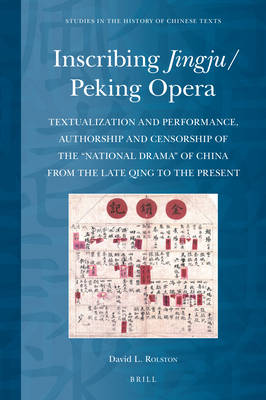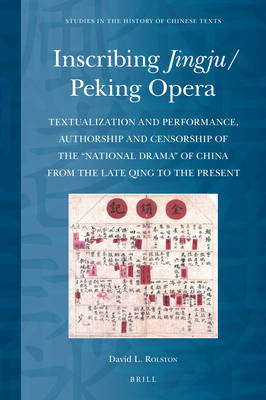
- Afhalen na 1 uur in een winkel met voorraad
- Gratis thuislevering in België vanaf € 30
- Ruim aanbod met 7 miljoen producten
- Afhalen na 1 uur in een winkel met voorraad
- Gratis thuislevering in België vanaf € 30
- Ruim aanbod met 7 miljoen producten
Zoeken
Inscribing Jingju/Peking Opera
Textualization and Performance, Authorship and Censorship of the "National Drama" of China from the Late Qing to the Present
David Rolston
€ 436,95
+ 873 punten
Omschrijving
What was the most influential mass medium in China before the internet? Jingju (Peking opera)! Although its actors were commonly thought to have been illiterate, written and other inscripted versions of plays became more and more important and varied.
This book shows how increasing textualization and the resulting fixation of a performance tradition that once privileged improvisation changed the genre. It traces, from Jingju's birth in the 19th century to the present, how texts were used for the production and consumption of this important performance genre and the changes in the concepts of authorship, copyright, and performance rights that took place during the process. The state's desire to police what was performed is shown to have been a major factor in these changes.
The scope and coverage of the book is already unprecedented, but it is also supplemented by an additional chapter (on where the plays were performed, who performed them, and who went to see them) available for download online.
This book shows how increasing textualization and the resulting fixation of a performance tradition that once privileged improvisation changed the genre. It traces, from Jingju's birth in the 19th century to the present, how texts were used for the production and consumption of this important performance genre and the changes in the concepts of authorship, copyright, and performance rights that took place during the process. The state's desire to police what was performed is shown to have been a major factor in these changes.
The scope and coverage of the book is already unprecedented, but it is also supplemented by an additional chapter (on where the plays were performed, who performed them, and who went to see them) available for download online.
Specificaties
Betrokkenen
- Auteur(s):
- Uitgeverij:
Inhoud
- Aantal bladzijden:
- 818
- Taal:
- Engels
- Reeks:
- Reeksnummer:
- nr. 12
Eigenschappen
- Productcode (EAN):
- 9789004461925
- Verschijningsdatum:
- 16/07/2021
- Uitvoering:
- Hardcover
- Formaat:
- Genaaid
- Afmetingen:
- 155 mm x 235 mm
- Gewicht:
- 1479 g

Alleen bij Standaard Boekhandel
+ 873 punten op je klantenkaart van Standaard Boekhandel
Beoordelingen
We publiceren alleen reviews die voldoen aan de voorwaarden voor reviews. Bekijk onze voorwaarden voor reviews.








